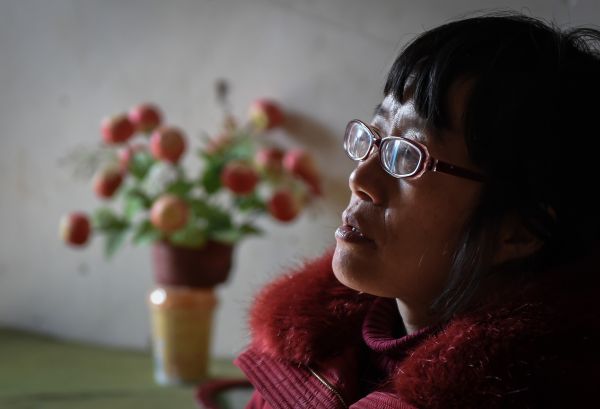
Yu Xiuhua, coming from the countryside of Hubei Province, introduced her poetry nationwide after writing for 16 years. (Xinhua/Cheng Min)
Grassroots literature is making waves nationwide, grabbing the attention of writers, readers, and academics throughout the country.
As China has urbanized, ever larger number of migrant workers flood into the cities to make their fortune. However, such cities are not always what they appear and migrants have difficulties adapting and improving their lives in the way they would wish. Now, many are taking to writing to document their struggles, and the writing is striking a chord.
Fan Yusu, 44, from central China's Hubei Province, works in Beijing as a baby sitter, and recently made a name for herself at home and abroad when her article "I am Fan Yusu" was posted on the WeChat subscription group "Noon-story," receiving over 100,000 views and widespread acclaim.
The article gives color to the tough challenges and Fan's stoic response to her life and work over ten years. She has since been labeled as one of the country's "migrant authors."
"I could not bear the dull rural life with a narrow view, so I came to Beijing. I hoped to see the world. That year I was 20." Fan wrote. "What are people supposed to do while being alive? I am incompetent and poor. What can I do?"
Jin Jianbin, a professor at the Tsinghua School of Journalism and Communication, feels the work has real value and told Xinhua that such grassroots literature had won favor with a number of his colleagues, who were moved by the plain sentiments of Fan's work.
"Fan's literal expression seems plain but it is real and memorable," one WeChat user wrote.
Jing Yueliang, an online content officer, she would now give more attention to vulnerable groups and ensure her concerns were more concrete.
"I would like to say hello to them and remember their surnames," she said. "But I have to admit that I could not feel Fan's real mental anguish as I am not her."
Fan does not write alone. In the village where she lives in Beijing, there is a literature group which was founded in October 2014. Her work is yet to be published but rumor has it that publishers have come knocking.
"Migrant authors hope to find sense of safety and dignity from writing," Jin said.
The People's Daily made a commentary late April saying that such literature struck at people's spiritual desires.
"It does not matter whether the writing is good or not," it said. " But what matters is that a baby sitter can tell people that someone and something special can be found even inside a humble rental house."
China is witnessing deep social change as it urbanizes, and migrant workers are exploring this transformation in literature.

Kang Pengfei, a grassroots writer in northwest China's Ningxia Hui Autonomous Region, operates his WeChat literature subscription. (Xinhua/Li Ran)
Working and living in large cities, many migrants still identify as farmers. Their disconnect with the city often leaves them in a state of confusion and panic. Literature is their way of making sense of the conflict and isolation in their lives.
"Their spiritual demand of expression is realized through writing," said Wan Jianzhong, a professor at the School of Chinese Language and Literature, Beijing Normal University.
Wan acknowledged that grassroots literature, including migrants' articles, differed from elite literature by breaking from traditional models and patterns, and not bowing to typical formal structures.
"Family and education should not be the decisive factor in being an author," said one online comment on "Noon-story."
"I know that Fan Yusu has been reading a lot since her childhood, observing humanity and society deeply and with sensitivity," Jin said. "Thus, in a sense, she is also an intellectual."
"We should not conclude that grassroots literature is lower than traditional literature," Wan said. "Literature should be inclusive and encourage all forms of writing."
Authors from the grassroots do not have professional literary training, but they are still able to make their mark.
"They are becoming authors easier than before," Wan said.
For deeper analysis, both in philosophy, sociology, and literature,people in China are turning to common daily life for answers, according to Wan.
"Once philosophy referred to speculation and abstraction," Wan said. "But it has been more concerned with specific real life since the end of the 1990s."
Wan believes that grassroots authors have emerged in the right philosophical context.
The use of the Internet has also helped pushed the popularity of grassroots literature.
"Literature used to be written by pens and needed being polished by editors with attainment before being published." Wan said. "But now the articles can quickly be uploaded online."
Wan said that the Internet had created the right conditions for grassroots literature to flourish.
Jin believes that grassroots literature being accepted by "opinion leaders" such as university professors could make it more popular.
"Communications used to be top-down in China, and grassroots literature has helped reverse that communication sequence," Jin said
Furthermore, according to Wan, grassroots literature shows how the common people's psychological needs and wishes are perceived by the government.
"Different from folklore, grassroots literature is created by people who have writing ability," Wan said. "China's folklore is a kind of written record of oral text from people who had no writing ability."
It is hard to know the exact number of grassroots authors in China since their writing is spontaneous and often flies under the radar. But it is finally being noticed as a powerful literary voice.
Wan predicts that more and more grassroots authors will emerge, making Chinese literature more diverse.
There are 280 million rural migrant workers in China, and their experince is being set down on the page, or the screen, more than ever before.
WeChat subscriber Zhou Hetai said that many literature lovers among China's grassroots lived ordinary and humble lives.
"They need to be discovered and given a platform to show their literature," Zhou said.